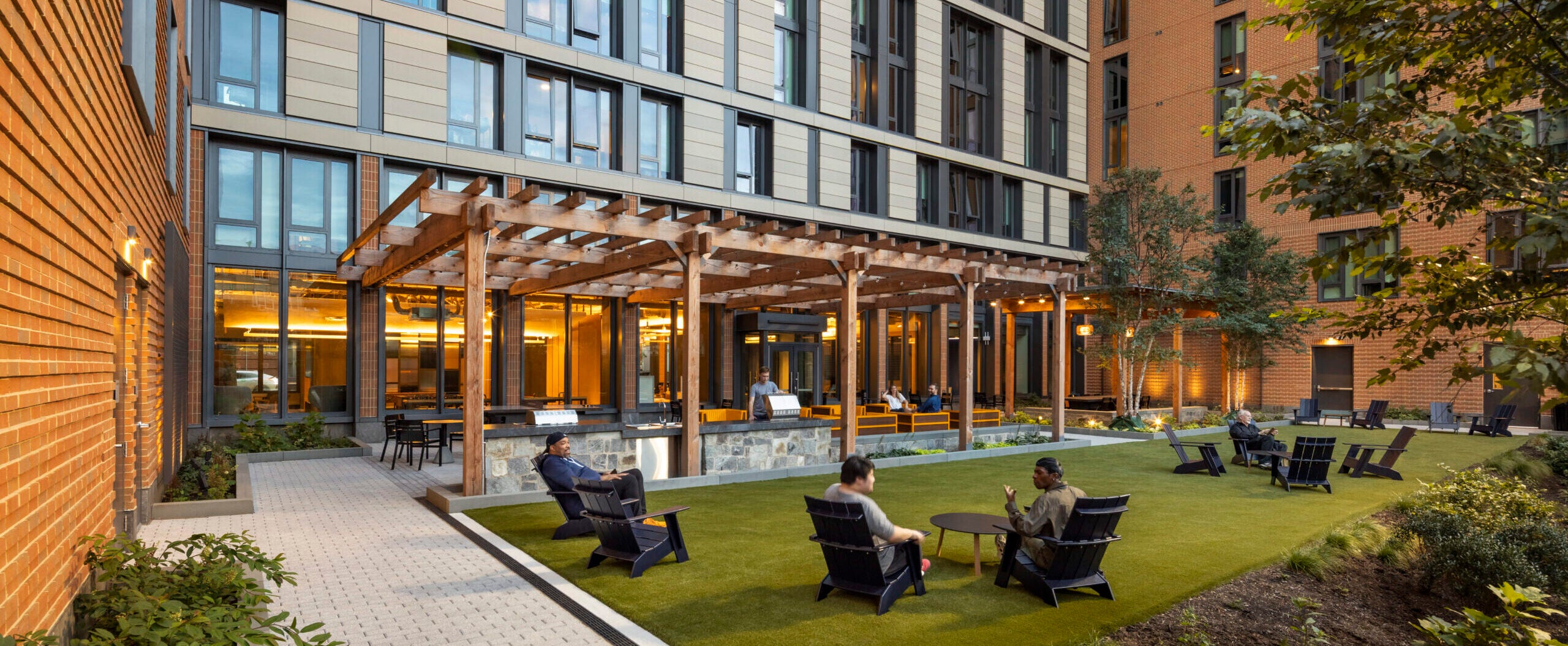Where To Live at Georgetown: A Grad Student Housing Guide
Janiah Rorie (G’26) chose Georgetown for graduate school because of housing.
Wanting to study public humanities in a city, Rorie reached out to schools in DC and metro areas of Georgia and Maryland that offered related master’s degrees before applying. The biggest question in her search was, where did graduate students live?
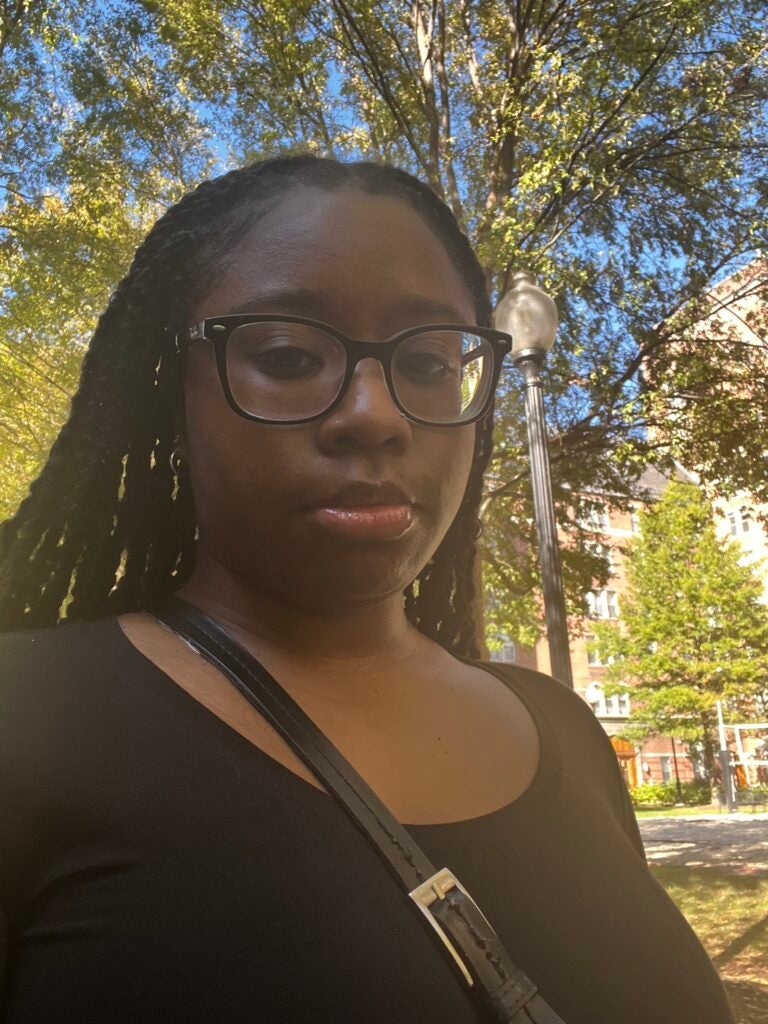
Janiah Rorie (G’26), a master’s student in Georgetown’s Engaged & Public Humanities program, chose to attend Georgetown because it offered on-campus graduate housing. (Courtesy of Janiah Rorie)
“Some didn’t get back to me,” said Rorie, from Winston-Salem, North Carolina. “But with Georgetown, the faculty in the Engaged & Public Humanities program were super helpful and gave me resources.”
Though many graduate students commit to a school before searching for housing, Rorie isn’t alone in stressing about the process. Finding affordable, student-friendly housing close to campus, work opportunities and transit in DC can be daunting, especially for those new to the area.
Georgetown offers resources to assist graduate students in their housing search, whether they’re living independently for the first time or are experienced renters. This guide provides an introduction to those resources, along with insight from university staff who are experts on the DC housing market.
On-Campus Housing: 55 H St. NW
Currently, 55 H St. NW is Georgetown’s only on-campus housing option for graduate students. Located in Georgetown’s downtown DC Capitol Campus and operated by the Residential Living team, the property opened in August 2022 and offers furnished single-occupancy bedrooms in 2-, 3-, and 4- bedroom apartments, in addition to a studio option.
The ability to live in campus housing as a graduate student cinched Rorie’s decision to attend Georgetown. An aspiring historian and curator, she liked that 55 H St. was walking distance from dozens of museums.
“Living at 55 H is an opportunity for graduate students to build their own community and what that looks like for them,” said Darnell Hammock, associate director for residential services on Capitol Campus. “The university is really growing the Capitol Campus, and these residents are part of a new venture for Georgetown.”
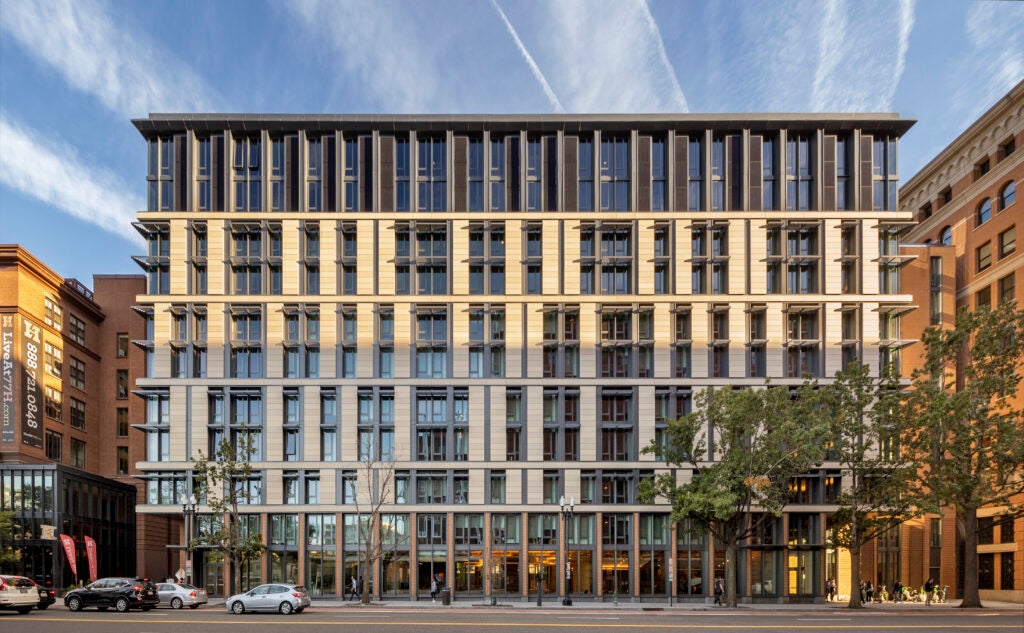
55 H St. NW, opened in August 2022, stands in Georgetown’s Capitol Campus. Free Georgetown shuttles link the apartment building to the Hilltop campus.
The complex’s rent rates are competitive for its location in DC’s NoMa neighborhood, Hammock added. All utilities are included, and students can pay for housing through their Georgetown student account, making 55 H St. a convenient option for international students and those accustomed to living in residence halls.
Transportation to the Hilltop campus and around DC from 55 H St. is easy, Hammock said. Free Georgetown University Transportation Shuttles (GUTS) stop outside 55 H St. and take students directly to Georgetown’s Hilltop campus, local grocery stores and Metro stops. City bus stops and the Metro Center subway stop are within walking distance.
“The GUTS shuttle system has been a lifesaver for me,” Rorie said. “I’ve been able to get to main campus and take shuttles to Rosslyn and Dupont Circle and other places around the city.”
The property is open 365 days a year and offers 24/7 security with an officer always on duty. All doors are accessed with student ID GoCards, Hammock said, and students studying late around Capitol Campus can use the property’s evening safety shuttles to get home easily.
No roommate? No problem, Hammock said. While students can select their roommates, Residential Living also offers the option to match tenants based on their responses to a living preference questionnaire.
A Week in the Life at 55 H – Georgetown University Capitol Campus
Rorie, who has lived solo at 55 H St. and with a roommate, said she appreciates the building’s sense of fellowship. Residential Living frequently hosts events and outings for residents, including cookouts in the building’s common spaces and group trips to local attractions.
“You get to know a lot of people,” Rorie said. “When people leave for breaks, they’ll say, ‘I have these groceries, and I’m putting them in the common area fridge if anybody wants anything.’ This is a nice community.”
What Else to Know
Amenities: Each floor has a community room with a kitchen, dining area and study lounge. The building offers a fitness center at no additional cost and two outdoor courtyards.
Furniture: Rooms are furnished with a bed frame and mattress, a desk and chair and a dresser and a built-in closet. An in-unit washer and dryer, which can be rare in DC, are available in each apartment’s shared space, in addition to a couch, coffee table and entertainment center.
When to apply: Applications open in February for housing agreements beginning in August. 55 H St. offers both 9- and 12-month housing agreements, with the 12-month option covering housing for students during the summer term. Apply via the Hoya Housing portal and contact 55hst@georgetown.edu with questions.
Janiah’s Favorite Places Near 55 H St. NW
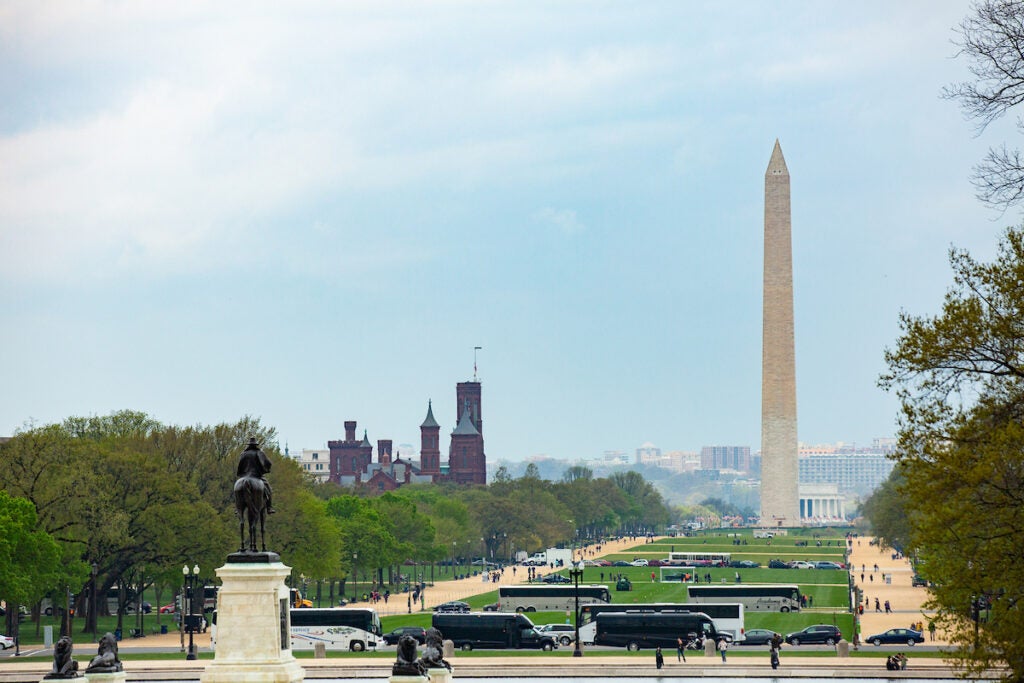
A view of DC’s National Mall, including the Washington Monument and Smithsonian Castle.
- Union Market: Walking distance from 55 H St., this food hall hosts over 40 vendors hawking everything from fancy breakfast toasts to barbecue, bubble tea and bao buns.
- Chinatown: A traditional Friendship Archway marks the entrance to this historic DC neighborhood, which offers authentic Chinese and Chinese-American fare nestled amid cultural spaces.
- The National Mall: National monuments, government buildings and world-class museums — many of them free — line this grassy stretch that forms the iconic image of DC. There’s almost always an event or festival happening here year-round.
Off-Campus Housing: Finding Your Home
The key to finding preferred housing in DC is to look early, said David Fleury, Office of Neighborhood Life program coordinator.
The Office of Neighborhood Life (ONL) recommends students start searching three to four months before their move-in date. This timeline gives students the best opportunity to find something with preferred amenities, especially if they want to live in a specific neighborhood, Fleury said.
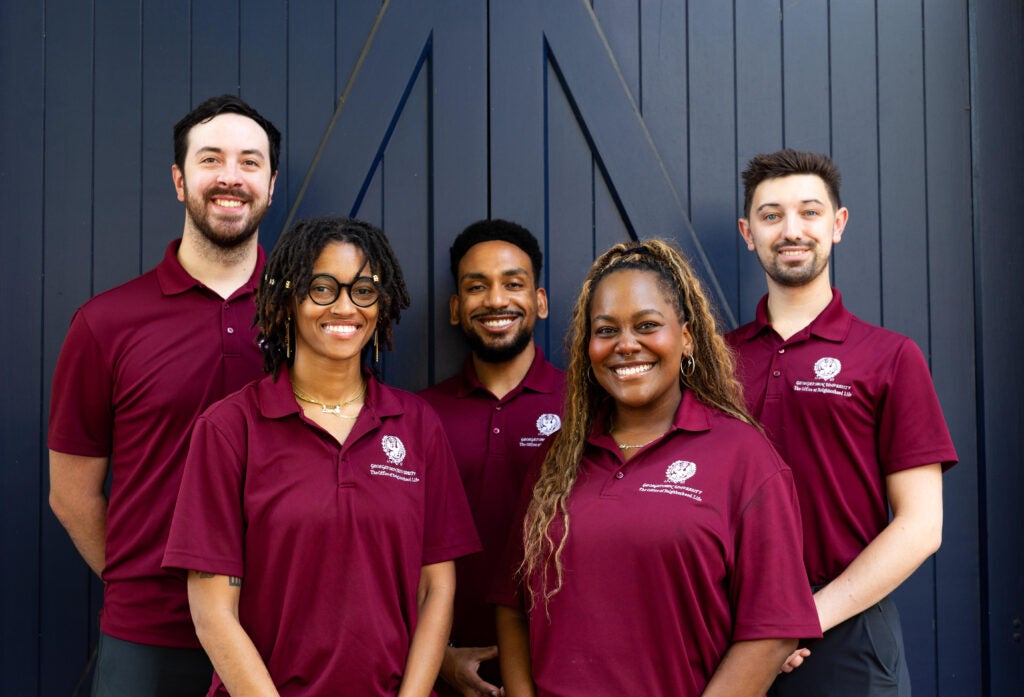
Georgetown’s Office of Neighborhood Life. David Fleury stands to the left, and next to him is ONL Assistant Director Laré Word.
Fleury and his team at ONL are Georgetown’s experts on student-friendly housing across DC and in nearby areas of Virginia and Maryland. ONL doesn’t find housing for students, but its staff can provide resources and support if students are stuck in their search.
ONL’s Off-Campus Housing website offers a searchable database of available rental properties in the areas surrounding Georgetown. Students can filter by price, lease term, amenities, nearby transportation options, accessibility features and more. The website also includes a roommate matching service where members of the Georgetown community can meet their next roommate and find additional housing options.
Georgetown students often live in the Dupont, Glover Park, Foxhall, Georgetown and Palisades neighborhoods of DC. Popular Virginia locations include Ballston, Clarendon, Courthouse, Crystal City, Pentagon City and Rosslyn.
Rental costs in the Georgetown area vary, Fleury said. Students seeking apartments in the neighborhoods immediately surrounding Georgetown can generally expect to spend more than students living in neighboring areas of Virginia and Maryland.
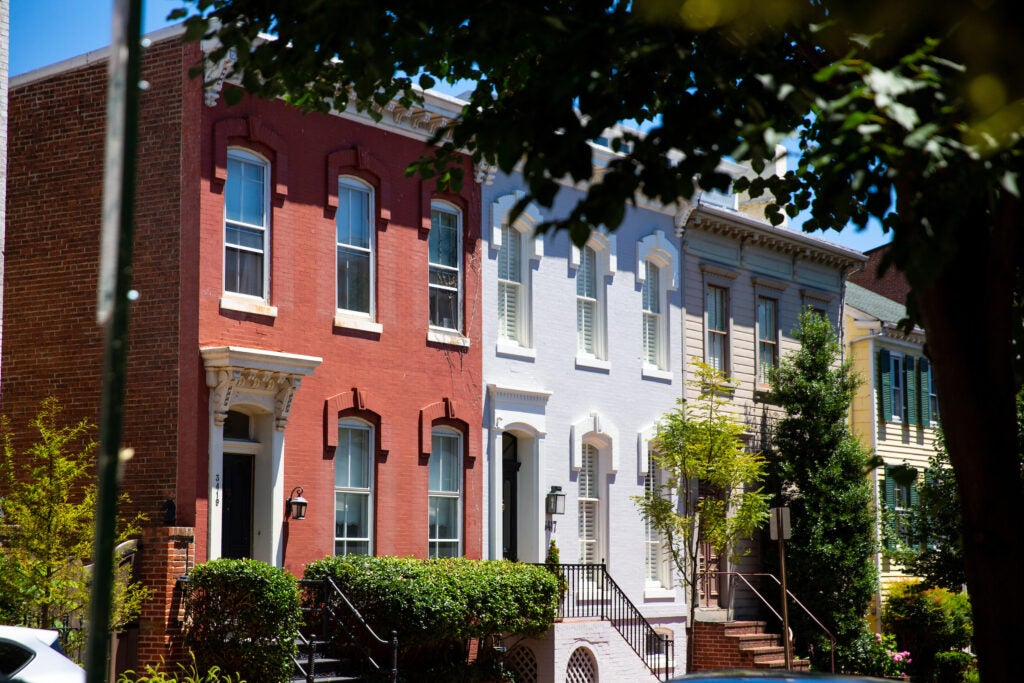
A row of homes in the Georgetown neighborhood, a popular area for students to live off campus.
Safety is the most important aspect of the housing search. ONL strongly recommends students meet property managers and tour housing options, in person if possible, before signing a lease or transferring any money.
“If it feels a little too good to be true, don’t pursue that lease,” Fleury said. “If students are hesitant, they can always reach out to us at neighborhoodlife@georgetown.edu and we can give our two cents.”
Students should also evaluate properties for essential safety features such as fire alarms, smoke and carbon monoxide detectors and emergency exits, said Laré Word, assistant director of ONL. The office recommends that people seeking housing in DC verify that the property manager has a valid Basic Business License, a legal requirement for landlords that ensures their property meets health and safety standards, via the city’s SCOUT database.
Real estate’s primary principle is “location, location, location.” ONL has an addendum for students: “document, document, document.”
“Leases are legally binding, so make sure you do a walkthrough of the apartment,” Word said. “Take pictures and video documenting the space and any damages before you move in, and share that information with your landlord or the leasing office so you can get your security deposit back at the end of the lease. Make sure you keep that documentation in one place.”
What Else to Know
Be a Good Neighbor: ONL compiles an annual Hoya Neighborhood Living Guide that is tailored to students living in the neighborhoods immediately surrounding Georgetown’s main campus (Georgetown, Burleith, Foxhall and the Cloisters) and that also includes advice for new DC-area residents. The guide is available at the ONL website.
International Students: ONL routinely hosts webinars on how to find housing as an international student at Georgetown, and its Off-Campus Housing website includes a filter to find properties that have experience renting to international students. Students with questions about documentation for housing applications should contact International Student & Scholar Services.
Transportation: The GUTS bus system connects Georgetown with transportation hubs around DC, including the Dupont Circle, Union Station and Rosslyn Metro stations operated by the Washington Metropolitan Area Transit Authority (WMATA). Many students living outside the DC area use a mix of local bus and/or rail systems, including Maryland Transit Authority (MTA) or Arlington Transit (ART), to connect to the WMATA and GUTS bus systems. GUTS stops and timetables are available on Georgetown’s Transportation website.
Living in DC
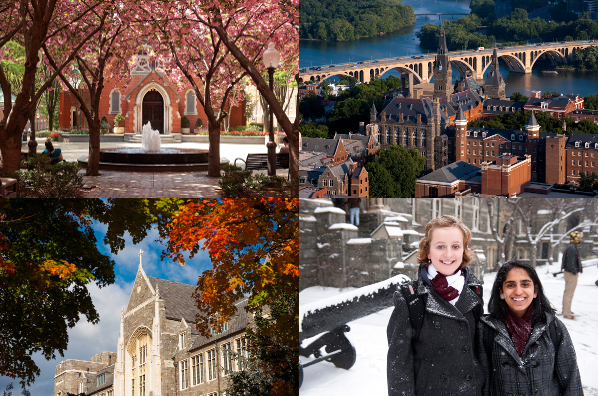
Both Graduate Studies and Georgetown University offer resources for newcomers to DC. Explore Graduate Studies’ tips for incoming students and browse the university’s guide to the city. Incoming students: Check your emails for additional DC tips from Graduate Studies and your program’s faculty and staff leading up to the start of the school year!
